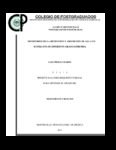Monitoreo de la retención y absorción de agua en sustratos de diferente granulometría
Abstract
Se evaluó el efecto del tamaño de partícula y frecuencia de riego en los cultivos de lechuga (Lactuca sativa) y jitomate (Solanum esculentum Mill) en semillero mantenidos en un invernadero tipo túnel. Las mezclas de sustratos fueron: fibra de coco-tezontle (Fc-Tz) (75:25 v/v) con dos tamaños de partícula (1-2 y 2-3 mm) y peat moss (sustrato comercial a granel) como testigo y las frecuencias de riegos (FR): 1 riego y dos riegos diarios (1RD y 2RD, respectivamente) y un riego cada tercer día (1RTD). Los nueve tratamientos se analizaron en un bloques al azar para dos factores con tres repeticiones. Se utilizaron charolas de unicel de 200 cavidades utilizando 30 cavidades por unidad experimental. Al tiempo del trasplante se evaluó: longitud de raíz (LR), diámetro del tallo (DT), número de hojas (NH), altura de planta (AP), peso seco de raíz (PSR), peso seco planta parte aérea (PSH) y contenido nutrimental en tejido vegetal. Para el caso de lechuga los resultados estadísticos (p≤0.05) mostraron efectos significativos en el tamaño de partícula de 2-3 mm con 2RD en: DT, AP, PSR y PSH así como en LR, DT, AP y PSR con 1RD además de una mayor extracción de macro y micronutrimentos. El cultivo de jitomate no presentó diferencias estadísticas significativas en las variables evaluadas, excepto el T5 (Fc-Tz 2-3 mm) con 2RD donde ocurrieron las mejores respuestas en peso seco del tallo (PST) y PSH, superando al testigo. También presentó mayor extracción nutrimental la Fc-Tz de 2-3 mm. La homogenizacion del tamaño de partícula así como la frecuencia de riegos tuvieron un efecto significativo en la mezcla Fc-Tz (75:25 v/v) de 2-3 mm que se vió reflejado en un mejor desarrollo del cultivo. La capacidad que tuvo la mezcla fibra de coco-tezontle de 2-3 mm de conservar mayor tiempo la humedad se pudo constatar de manera más precisa con el uso de sensores, ya que estos permitieron monitorear la humedad presente en el sustrato y relacionarlo con el estrés hídrico que presentaron las plantas cuando alcanzaron tensiones arriba de 12 kpa. _______________ MONITORING OF WATER ABSORPTION AND RETENTION SUBSTRATES OF DIFFERENT PARTICLE SIZE. ABSTRACT: The effect of homogenization of particle size in three mixtures of substrates and three irrigation frequencies in cultures of Lettuce (Lactuca sativa) and tomato (Solanum esculentum Mill) in seedlings kept in a tunnel-type greenhouse. The mixtures were: coconut fiber-tezontle (CF-TZ) (75:25 v / v) with two particle sizes (1-2 and 2-3mm) and peat moss (commercial bulk substrate) as a witness, and three frequencies of irrigation (FI): A daily irrigation (DI), two daily watering (TDW) and watering every other day (WOD). New therapies are tested in a randomized block design for two factors with three replications. We used styrofoam trays of 200 cavities using 30 chambers per treatment. At the time of transplant was evaluated: root length (RL), stem diameter (SD), number of leaves (NL), plant height (PH), root dry weight (RDW), aboveground plant dry weight (PDW) and nutrient content in plant tissue. Lettuce In the case of statistical results (p≤ 0.05) showed significant effects on the particle size of 2-3mm in 2DW: SD, PH, RDW and homeless as well as in RL, SD, PH and RDW 1DI addition to increased extraction of macro and micronutrients. The tomato crop showed no statistically significant differences in the variables evaluated, except T5 (CF-TZ 2-3 mm) with 2RD where the best responses occurred in the stem dry weight (SDW) and PDW, surpassing the witness. Also had higher nutrient extraction CF-TZ 2-3 mm. The particle size and frequency of irrigation had a significant effect on CF-TZ mixture (75:25 v / v) of 2-3 mm which was reflected in better crop growth. The ability of the mixture was coir-tezontle 2-3 mm longer retain moisture it was found more accurately with the use of sensors, since they allowed to monitor the moisture in the soil and relate the water stress when plants had reached above 12 kPa tension.
Collections
- Tesis MC, MT, MP y DC [349]


